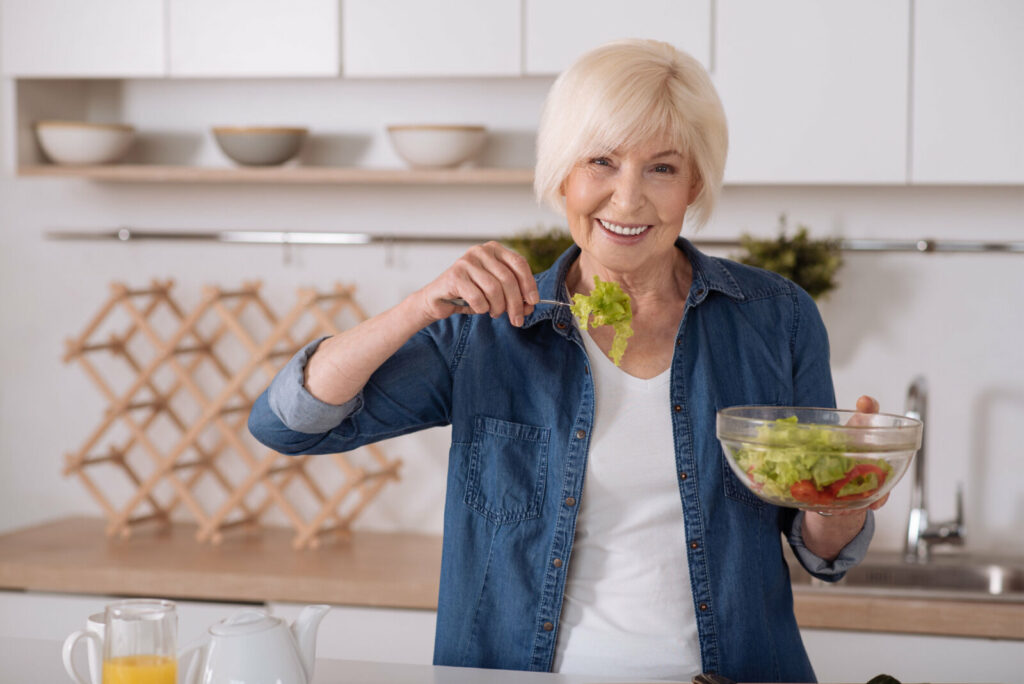Eating Healthy While Aging
As many as 50% of older adults are at risk of malnutrition. Multiple factors increase seniors’ risk of eating and diet problems, from social isolation to physical limitations.
Whether seniors live independently, in assisted living, or another lifestyle option, seniors and their caregivers should know the risks.
What Is Undernutrition?
Malnutrition is when the body lacks necessary nutrients (undernutrition) or takes in too many calories (overnutrition). Undernutrition can happen even when seniors eat enough food or too much food, as it’s a problem with diet quality.
For example, eating 4 pizza slices can make you feel full, but it may not satisfy your body’s nutrition needs. Likewise, eating a plate full of fresh vegetables may seem healthy. Still, if that’s all you eat, you’re not consuming enough calories—or other nutrients—to maintain your health.
In other words, healthy eating is a balance.
Although the signs of malnutrition can vary, there are warning signs. Symptoms of undernutrition can include:
- Delayed wound healing
- Depression & anxiety
- Dry hair & skin
- Loss of fat & muscle mass
- Hollow cheeks & sunken eyes
- A swollen stomach
- Fatigue or difficulty concentrating
- Irritability
- Unintentional weight loss
Undernutrition in seniors can have multiple health effects, from maintaining bone and muscle strength to preventing or recovering from illnesses.
Causes of Malnutrition in Seniors
Older adults are more at risk for malnutrition because nutrition needs change. Health conditions can also impact appetite, digestion, or eating habits. Common factors can include:
- Chewing & swallowing problems
- Decreased appetite
- Decreased ability to absorb nutrients
- Changes to metabolism & digestive system
- Weakened sense of taste
Social isolation and depression can cause seniors to lose interest in food. They may not feel hungry or gravitate towards unhealthy food choices—likely because the meal preparation is easy or the food tastes good. Seniors need social connections and a community to thrive. Eating with friends or family is a chance to model healthy food habits.
Dental issues or difficulty swallowing can make eating uncomfortable or painful. The problem may be caused by an undiagnosed health issue or ill-fitted dentures.
Seniors with Alzheimer’s disease or dementia are at risk for undernutrition because of cognitive changes. They may experience decreased appetite or changes in food preferences. They may not recognize food or have difficulty remembering when they’ve eaten.

Preventing Malnutrition in Seniors
Many circumstances can make maintaining a healthy diet challenging, whether it’s a physical, mental, or emotional issue. Therefore, preventing undernutrition should be approached individually, as seniors likely have unique needs.
However, here are simple tips to help seniors stay well-nourished:
Know what malnutrition is and isn’t. A healthy diet is more than how much you eat; it’s also the quality of your diet. Malnourished seniors can come in all shapes in sizes, even appearing obese. Nourishment is often a balancing act, so seniors should have regular checkups with a health care provider to prevent nutrition from being overlooked.
Make smart food choices. Most people know the basics of avoiding added sugar or takeout, but what about the differences between lean chicken and a steak? Seniors can enjoy a varied diet while prioritizing the nutrients they need to maintain their health.
Consult MyPlate for a closer look at what you need as an individual. Nutrition needs vary depending on lifestyle, health, gender—and many more unique factors.
Add nutritional supplements. When it’s challenging to receive the nutrients you need through food, supplements can support your diet. Although oral supplements can’t erase the need for healthy eating, they can lessen the burden. Supplements can provide protein, calories, vitamins, minerals, and more.
Take care of your oral health. Dental and oral problems can impact your ability to eat well. So it’s crucial to visit the dentist regularly to take care of your teeth, gums, jaw, and oral structures. Even when seniors don’t complain about their teeth, dentists can detect health issues affecting their whole-body health.
Consult your health care provider. Seniors should talk to their doctor when they experience changes in appetite, difficulty chewing or swallowing, unintentional weight loss, or any issues that affect eating. Seeking professional advice can help seniors and their loved ones find personalized solutions.
Ask for help. When barriers prevent nutrition, family members, caregivers, or a close-knit community can help seniors access the necessary resources. For example, when buying or preparing food is a problem, seniors may enlist the help of a driver or meal preparation services.
There are many ways caregivers can support seniors—whether or not you consider yourself a good cook. Caregivers or family members might connect seniors with a registered dietician or a health care provider. Taking time to listen to or observe your loved one’s needs can go a long way to providing the support they need.
Connecting with a Community
Receiving the support of a caring community can help seniors thrive. At Parsons House Cypress, we provide a wide range of life-enriching services and customizable lifestyle options. With chef-prepared meals and a full social calendar, seniors will always have access to delicious food and good company.
Contact us or book a tour to learn more about our community!


